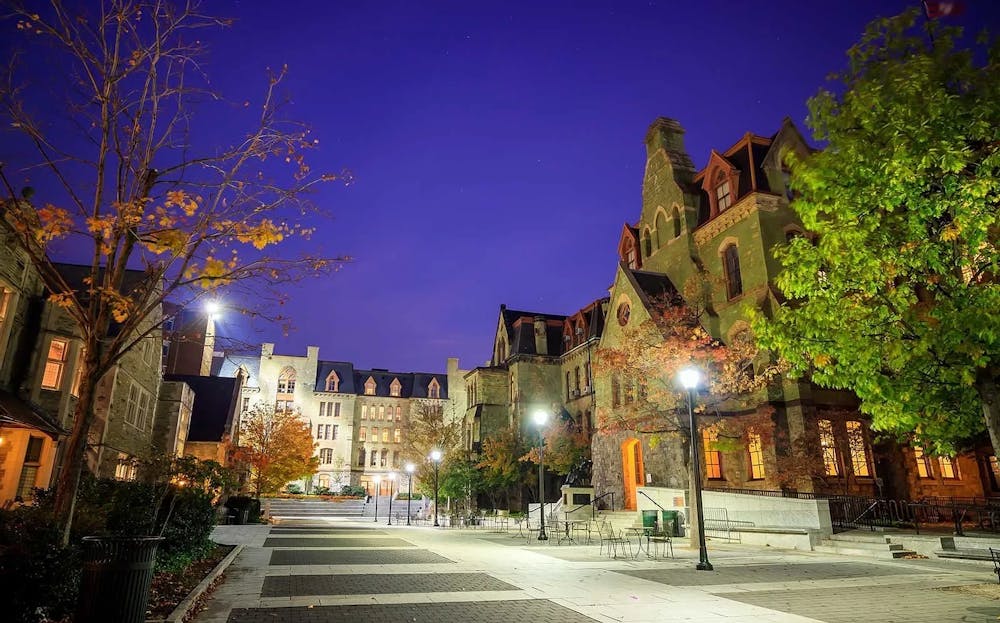This afternoon, the University of Pennsylvania announced a plan to donate $100 million to the School District of Philadelphia (SDP) over the course of a decade. The donation will be broken into ten $10 million increments. This announcement comes after months of organizing by local community groups for payments in lieu of taxes (PILOTs) from the university.
In an announcement sent to all Penn students and faculty at 1:00pm today, Penn’s President Amy Gutmann explained the contribution “will be used to remediate environmental hazards, including asbestos and lead, in our public school buildings.”
In response, many groups, including Penn for Pilots—a coalition of Penn faculty formed this summer—say that the announced $100 million donation is still not enough. They cite that a $10 million annual contribution falls nearly $30 million short of a PILOTs program.
The recent push for PILOTs from Penn and the city’s other “mega-nonprofits” began this May, when Jobs with Justice Philadelphia held a panel compiled of students, teachers, and parents from the District. Months later, on July 8th, hundreds of faculty members at Penn began a petition calling on their employer to make regular contributions to the District. Since its founding, the petition has garnered 1,117 Penn faculty signatures, and the number continues to grow.
“Penn is the largest property owner in the city of Philadelphia, but as a non-profit institution, it pays no property taxes on its non-commercial properties,” the petition reads. “In other words, it contributes nothing to the tax base that funds Philadelphia’s public school system—this in a city whose schools are underfunded and facing deep budget cuts amid the COVID-19 pandemic.”
In a press release regarding Penn’s $100-million-over-ten-year contribution plan, Penn for Pilots maintains that “the chronic underfunding of the Philadelphia Public Schools cannot be resolved with a limited commitment of ten annual payments; it requires a system of public finance that ensures that the city's wealthiest institutions pay their fair share every year in perpetuity.”
Penn for Pilots and other local organizations remain steadfast in their push for PILOTs. Professor Gerald Campano from Penn’s Graduate School of Education says: "The announcement of the $100 million gift is a testimony to decades of grassroots work from community members, students, educators, and most recently faculty and staff. The payment is an important recognition from Penn of the challenges facing SDP, but it falls significantly short of PILOTs both in terms of the amount and its time-bounded commitment. Charity is not social and racial justice. Penn remains the largest private landowner in Philadelphia, and we will continue to mobilize until Penn pays PILOTs and fulfills its Civic Responsibility."
Wait, let’s back up a little… What are “PILOTs”?
In Philadelphia, 17% of all real estate is tax-exempt because it’s either owned by the government or by a nonprofit organization. PILOTs are voluntary donations (payments) paid to the city every year instead of a real estate tax (in lieu of taxes). Typically, PILOTs represent a fraction of what the real estate tax would be.
Would PILOTs from Penn make any difference?
According to the School District of Philadelphia, local contributions made up 49.6% of the District’s approximately $3.38 billion budget. Of those local contributions, about 51% is derived from Philly’s real estate tax. As aforementioned, 17%—or $29.6 billion—of Philly’s real estate is tax-exempt.
The University of Pennsylvania is the city’s largest private property owner. The institution itself owns $2.56 billion of non-taxable land within the city. Penn for Pilots predicts that if Penn contributed 40% of what they would pay in real estate tax towards an Education Equity Fund, it would amount to roughly $36.9 million a year.
Enjoy what you're reading?
Signup for our newsletter
To put $36.9 million a year into context, the District spent $74 million on “nurses, counselors, and psychologists,” $55 million on English Language Learning, and $187 million on “faculties and utilities” in Fiscal Year 2021.
Does the School District of Philadelphia really need Penn’s contributions?
Yes. As Penn’s press release states, “the School District currently has an estimated $4.5 billion in unmet capital needs.” According to The Public Interest Law Center, “Pennsylvania has one of the worst funding gaps in the nation.” The current guidance counselor to student ratio in the SDP is 1 to 392, 142 students higher than the recommended ratio of 1 to 250 counselors. Only nine of the SDP’s schools have certified librarians, placing Philadelphia last in the school to librarian ratio in the United States.
For more information:
Peruse the websites of Penn for Pilots and Jobs With Justice: www.pennforpilots.org, https://phillyjwj.org/our-work/fund-philly-schools/
Watch The Bullhorn’s information session and panel on PILOTs and school funding: https://www.youtube.com/watch?v=nUcqpTPEzPQ&list=PLW0iG59pYSG8j7HQ2_dS6ApWox9p4HG3Z




